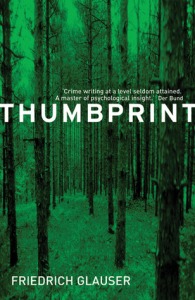“Everyone is at least half mad and any investigation has to take that into account.”
 I’ve had a handful of Friedrich Glauser novels on my bookshelf for some time, and German Literature Month was the perfect time to blast off with the first book from the series featuring Sergeant Studer: Thumbprint. My copy, from Bitter Lemon Press, has a short biographical paragraph about the author and an excerpt from a letter written by the author in 1937. Glauser, a morphine and opium addict, was born in Vienna in 1896. He served in the Foreign Legion (there’s a Foreign Legion novel apparently that I would love to read,) was sent to prison and spent years in psychiatric wards and insane asylums. He died of a stroke in 1938 at the age of 42. He left behind a body of work that includes 5 Sergeant Studer novels which are all set in the 30s. Given Glauser’s history, I knew I had to read his work.
I’ve had a handful of Friedrich Glauser novels on my bookshelf for some time, and German Literature Month was the perfect time to blast off with the first book from the series featuring Sergeant Studer: Thumbprint. My copy, from Bitter Lemon Press, has a short biographical paragraph about the author and an excerpt from a letter written by the author in 1937. Glauser, a morphine and opium addict, was born in Vienna in 1896. He served in the Foreign Legion (there’s a Foreign Legion novel apparently that I would love to read,) was sent to prison and spent years in psychiatric wards and insane asylums. He died of a stroke in 1938 at the age of 42. He left behind a body of work that includes 5 Sergeant Studer novels which are all set in the 30s. Given Glauser’s history, I knew I had to read his work.
Thumbprint begins with Sergeant Studer discovering that the man he has just arrested for murder, an ex-con named Erwin Schlumpf, has attempted suicide in his cell. Studer, acting on intuition, returns to Schlumpf’s cell and resuscitates him–perhaps it’s this act which sparks Studer’s determination to discover the truth behind the crime Schlumpf is accused of. It seems to be an open-and-shut case, and while all those involved in the judicial machinery are happy to close the books on this murder, Studer isn’t satisfied that Schlumpf is guilty. Schlumpf is accused of laying in wait for salesman, Witschi, robbing him and committing murder in the process. It doesn’t help Schlumpf’s case that he was seen later that night at a tavern spending a large amount of money….
 This first chapter which opens with Schlumpf’s attempted suicide is called: “A Man Has Decided to Call it a Day,” and that should give you an idea of the type of humour here. One of the best aspects of this police procedural is the main character, Studer. He’s odd and unconventional. When he travels to the country village of Gerzenstein to investigate the murder which is supposedly already solved, Studer senses that the village is a close knit community full of secrets and lies. Studer has far better relationships with all the ex-cons employed in a local nursery than the so-called respectable, upstanding citizens of Gerzenstein. There’s a lot that’s odd about the case. The accused killer, for example, is in love with the victim’s daughter, and the victim who’d dabbled in various investment scams was heavily in debt. Why aren’t the victim’s son and wife mourning? And what about the insurance policy on the victim’s life? Why are the ex-cons hired by the nursery owner willing to help while the locals give Studer the cold shoulder?
This first chapter which opens with Schlumpf’s attempted suicide is called: “A Man Has Decided to Call it a Day,” and that should give you an idea of the type of humour here. One of the best aspects of this police procedural is the main character, Studer. He’s odd and unconventional. When he travels to the country village of Gerzenstein to investigate the murder which is supposedly already solved, Studer senses that the village is a close knit community full of secrets and lies. Studer has far better relationships with all the ex-cons employed in a local nursery than the so-called respectable, upstanding citizens of Gerzenstein. There’s a lot that’s odd about the case. The accused killer, for example, is in love with the victim’s daughter, and the victim who’d dabbled in various investment scams was heavily in debt. Why aren’t the victim’s son and wife mourning? And what about the insurance policy on the victim’s life? Why are the ex-cons hired by the nursery owner willing to help while the locals give Studer the cold shoulder?
While Studer is an unconventional, outwardly unimpressive detective, obviously favouring the underdog, Studer can also be his own worst enemy. After saving Schlumpf, he begins questioning the magistrate in charge of the case, and manages to move the magistrate from a stubborn, snotty lack of cooperation to impressing the magistrate into listening about the holes in the case against Schlumpf. This is all achieved by Studer’s understanding of human nature and adjusting his attitude in order to get under someone’s skin.
The examining magistrate broke off, though he couldn’t have said why himself. The man on the chair before him was a detective, a simple policeman. He was middle-aged and there was nothing special about him: a shirt with a soft collar, a grey suit that had gone slightly baggy in places because the body inside it was fat. He had a thin, pale face with a moustache covering his mouth so that you didn’t know whether he was smiling or not. And this simple policeman was sitting there in the chair, legs apart, forearms resting on his thighs, hands clasped …
The magistrate himself couldn’t have said why he suddenly adopted a slighty warmer tone.
“You must realize, Sergeant, that it looks to me as if you’ve exceeded your authority.” Studer nodded and nodded. Of course, his authority! “You handed over this Erwin Schlumpf to the prison officer, all according to regulation. What reason did you have for going back to see him again? Your return, I have to admit, was highly opportune, but that is not to say that it is covered by police authority. You have been with the force long enough Sergeant, to know that productive collaboration between the various branches of the legal system is only possible if each ensures to stay strictly within the limits of its own authority …”
That word: authority. Not just once, no, three times. Now Studer knew where he stood. That’s a piece of luck, he thought, they’re not the worst, the ones who keep going on about their “authority”. You just have to be nice to them and let them see you take them seriously and you will have them eating out of your hand.
That’s a really long quote, but it gives a sense of the author’s style but more importantly, it gives a strong presentation of Studer’s character. He can read people–the problem is, however, that while his readings are accurate, he can’t keep in the appropriate role, in this case, of obsequiousness. He’s too sincere, too intense a thinker, so while he adopts the appropriate role, he always slips out of his contrived character when he starts thinking.
Thumbprint is at its best in its emphasis on the psychological aspects of the case and in the character of Studer, a man who’s both endearing and admirable. On the down side, too much of the solution piles up in the last few pages, but I enjoyed this enough to commit to the rest of this unique series.
Translated by Mike Mitchell.

This sounds excellent. I do like an unconventional detective and Shlumpf is the best character name I have heard in a long time!
Sorry, Schlumpf! Even better…
Sounds like a promising series, Guy – a sequence of five novels should give sufficient scope for development of Studer’s character. It’ll be interesting to see how you find the next one.
I’m glad to hear you liked this. I’ve got all of his novels but haven’t read any (they are in two tomes, so I wasn’t that greedy). His life was pretty sad. I also got a biography and think it will be interesting to read. But tragic.
Someone asked me to look for crime fiction books from the 1930s. Here’s one! thanks. It sounds good, I like the quotes.
Glauser’s biography sounds a little like Hans Fallada what with the addictions and the mental illness. This sounds interesting, but perhaps modern crime writers have rather more sophistication in plotting etc. Nice review Guy